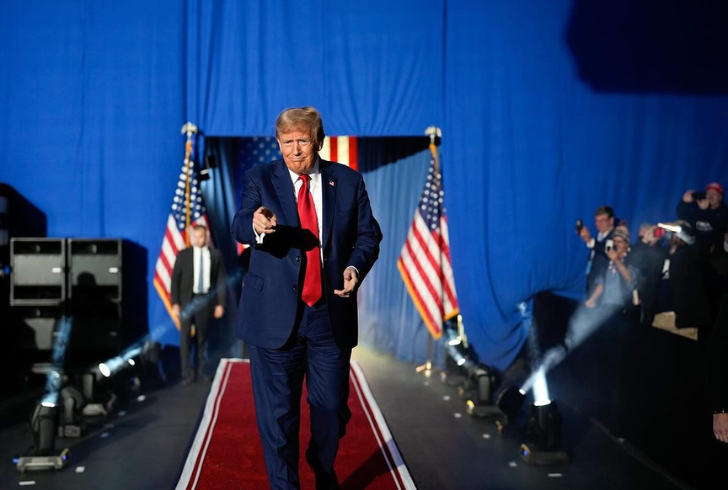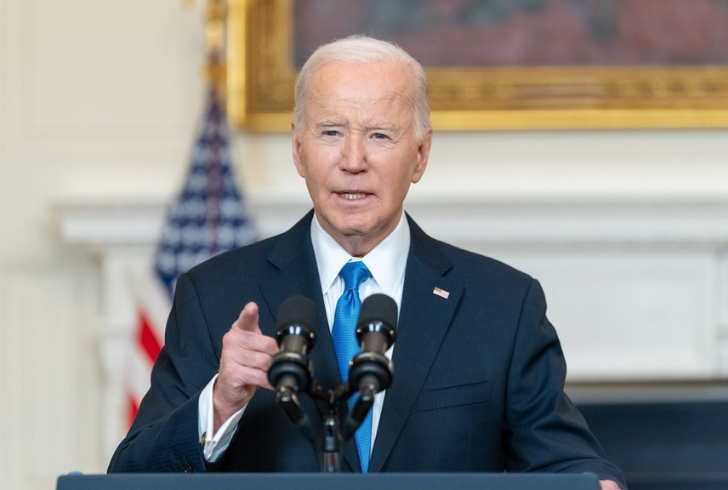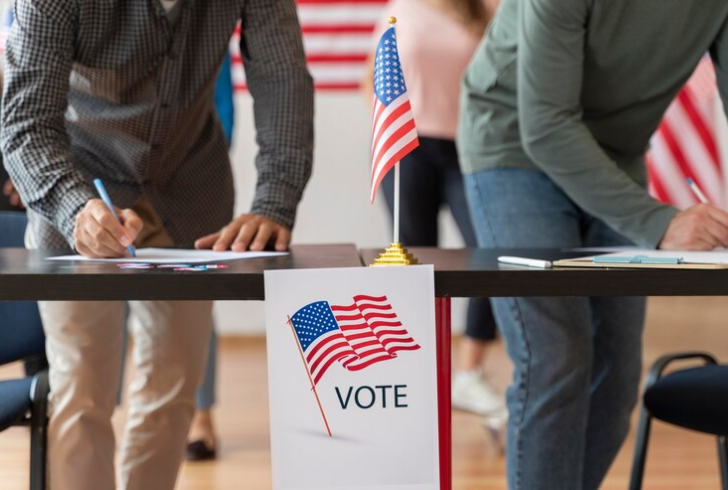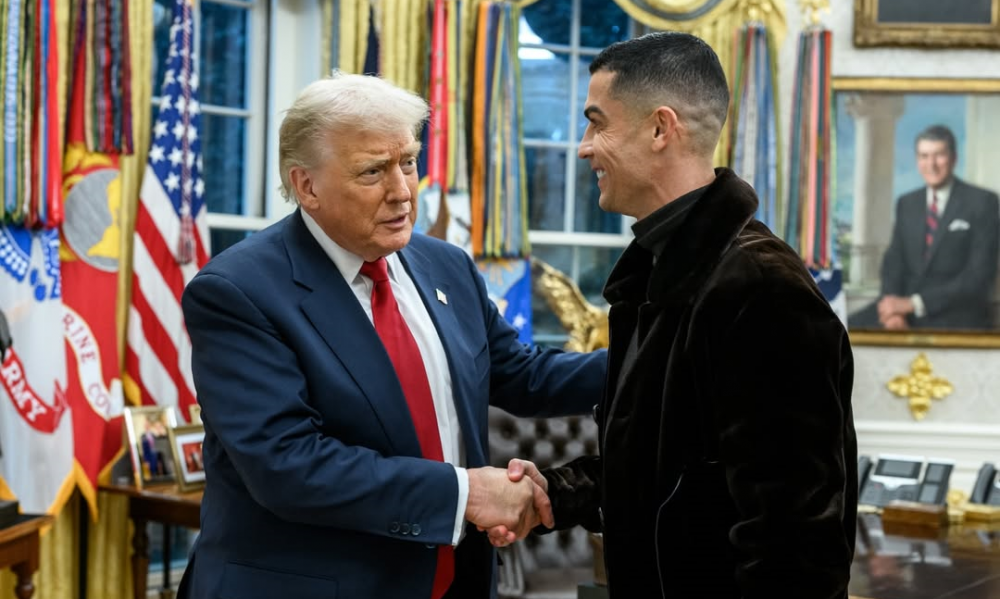As the 2024 presidential election draws near, the competition heats up, with candidates from both major parties and independent runners throwing their hats in the ring. The contest promises a mix of familiar faces and new challengers, each bringing their unique perspectives and policy proposals to the forefront of American politics.
The Republican Front-Runner: Donald Trump
Leading the Republican charge is former President Donald Trump, who announced his bid for a comeback on November 15, 2022. Despite facing skepticism from parts of his party and ongoing legal challenges, Trump's unwavering base could be his ticket to securing the nomination once more.
Trump's campaign is a blend of defiance against his critics and a pledge to resume his agenda, despite the controversies that shadow his political career.

Instagram | teamtrump | Former President Donald Trump announces his bid for a comeback.
The Democratic Incumbent: Joe Biden
On the Democratic side, President Joe Biden aims for a second term, officially entering the race on April 25, 2023. Biden, with a long history of public service as a senator and vice president, pitches to voters his desire to "finish the job."
His tenure boasts achievements in infrastructure, the economy, and civil rights. Yet, Biden must navigate concerns about his age and mixed approval ratings, even as he stands unchallenged within his party.

Instagram | potus | President Joe Biden officially enters the race for a second term.
The Contenders
- Nikki Haley: The former South Carolina governor and U.N. ambassador, known for her moderate beginnings, pivoted towards the GOP's right wing. Announcing her candidacy on February 14, 2023, Haley proposes a generational shift in leadership and advocates for cognitive tests for politicians over 75.
- Ryan Binkley: A Texas CEO and pastor, Binkley is a political outsider focusing on conservative values. His campaign, launched on April 23, 2023, emphasizes traditional Republican principles.
- Robert F. Kennedy Jr.: Once a Democrat, Kennedy Jr. now runs as an independent. His campaign, starting on April 5, 2023, has been controversial due to his anti-vaccine stance. Despite his famous lineage, his views have placed him at odds with mainstream Democratic politics.
- Cornel West: The philosopher and activist entered the fray on June 5, 2023, as an independent, after initially aligning with the People’s Party. West’s campaign focuses on truth and justice, challenging the political status quo with his intellectual and activist background.
- Dean Phillips: A businessman and Congressman from Minnesota, Phillips threw his hat into the ring on October 27, 2023, voicing concerns about Biden's viability against Trump. Phillips represents a moderate Democratic stance with a focus on fiscal responsibility and social justice.
- Marianne Williamson: The spiritual author and activist, known for her 2020 run, reentered the political arena on March 4, 2023, but withdrew on February 7, 2024. Williamson's platform centered on progressive values and social justice, distinguishing her as a unique voice in the race.
- Ron DeSantis: The Florida governor, once seen as a strong contender against Trump, announced his candidacy on May 24, 2023, but exited the race on January 21, 2024. DeSantis's policies, particularly those involving education and culture wars, have sparked debate within the GOP.
- Asa Hutchinson: Announcing his bid on April 2, 2023, and dropping out on January 16, 2024, the former Arkansas governor positioned himself as a critic of Trump within the party, representing a more traditional Republican viewpoint.
- Vivek Ramaswamy: The young entrepreneur and author entered the race on February 21, 2023, with a platform opposing "wokeness" and promoting free-market principles. However, his campaign ended on January 15, 2024.
- Mike Pence: The former vice president challenged his former boss with a campaign launched via paperwork filing on June 5, 2023, but withdrew on October 28, 2023. Pence aimed to appeal to evangelical and conservative voters with a traditional GOP platform.
- Tim Scott: The South Carolina senator announced his candidacy on May 19, 2023, presenting an optimistic vision rooted in the American Dream. Despite his efforts, Scott ended his campaign on November 12, 2023.
- Chris Christie: The former New Jersey governor, known for his direct style, entered the race on June 6, 2023, positioning himself as a critic of Trump. Christie's campaign, however, concluded on January 10, 2024.
- Larry Elder: The conservative commentator and attorney launched his bid on April 20, 2023, but stepped down on October 26, 2023. Elder's campaign focused on criticisms of Democratic policies and support for Trump's agenda.
- Doug Burgum: North Dakota's governor, emphasizing economic and conservative issues, started his campaign on June 7, 2023. Despite his efforts, Burgum withdrew on December 4, 2023.
- Perry Johnson: The businessman entered the race on March 2, 2023, with a focus on fiscal conservatism but ended his campaign on October 20, 2023, after facing challenges in gaining traction.
- Steve Laffey: Announcing his candidacy on February 2, 2023, the former Rhode Island mayor and banker focused on financial reform but ended his long-shot bid on October 6, 2023.
- Will Hurd: The ex-Congressman from Texas and critic of Trump joined the race on June 22, 2023, only to withdraw on October 9, 2023, later endorsing Nikki Haley.
- Francis Suarez: Miami's mayor aimed to bring a new perspective to the GOP field but exited the race on August 29, 2023, after failing to qualify for the debates.

Freepik | Voters choose leaders to address challenges with integrity, wisdom, and effective governance.
Looking Ahead
The 2024 presidential race features a diverse field of candidates across the political spectrum. With a mix of ideas and personalities, voters will weigh policies, debate performances, and candidates' ability to connect with Americans. The election will test political alliances, the appeal of traditional versus new-age policies, and the desire for change or continuity.
The primaries, especially for Republicans, involve a dynamic mix of Trump loyalists, traditional conservatives, and advocates for a fresh direction. Democrats, led by President Biden, aim to solidify support within their base and appeal to independents and moderates. Independent candidates like Robert F. Kennedy Jr. and Cornel West add an intriguing twist, drawing votes from both major parties.
Key issues such as economic policy, healthcare, climate change, and social justice will dominate the discourse, requiring candidates to articulate clear, compelling visions that resonate with the American people. Voters face the task of identifying leaders capable of addressing the nation's challenges with integrity and effective governance amid the rhetoric.



